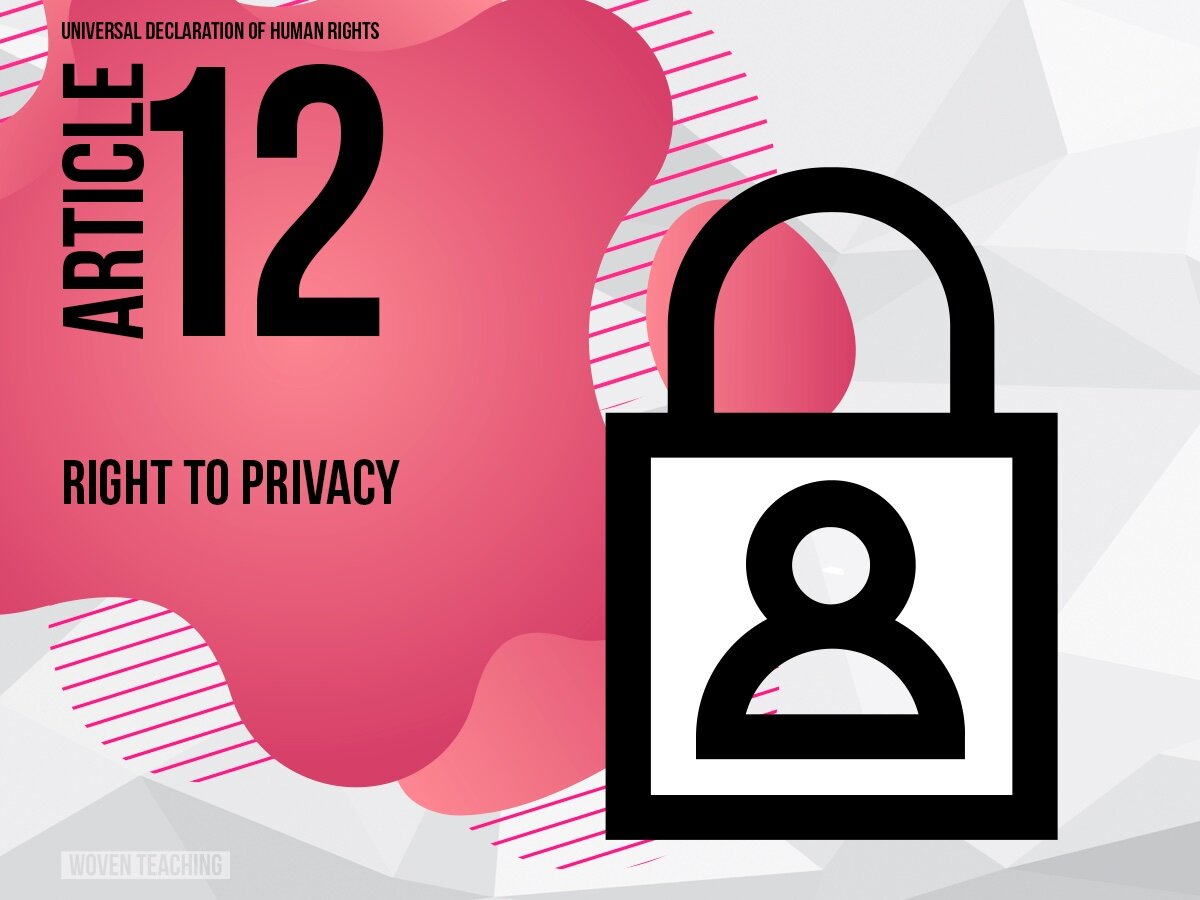Article 12:
Right to Privacy
Full Text
No one shall be subjected to arbitrary interference with [their] privacy, family, home or correspondence, nor to attacks upon [their] honour and reputation. Everyone has the right to the protection of the law against such interference or attacks.
Student Text
You have the right to privacy. No one can enter your house, open your letters, or bother you or your family without a good reason. No one is allowed to harm your good name.
Lesson Plan
Time: 60 minutes
Ages: 14-18 (Grades 9-12)
Overview of activities: Students will…
Write reflectively about a time when their privacy was violated
Work with a partner to analyze a real-world case study about violations of privacy
Form opinions about the balance between safety and privacy
Complete an exit card asking them to reflect on the ways in which they can uphold the right to privacy for themselves and others
Accompanying slides are available via Google Slides
Introduction to the UDHR
Woven Teaching believes that human rights education is essential for students to understand and assert their own rights and to protect the rights of others. As a result, the Universal Declaration of Human Rights (UDHR) lies at the core of Woven Teaching’s materials. The document’s 30 articles outline fundamental human rights: basic rights and freedoms which every human being is entitled to, regardless of the person’s race, religion, birthplace, gender, sexual orientation, or other characteristics. Although its articles are not legally binding, the UDHR serves as the moral compass for the international community. Article 8 of the UDHR outlines the right to effective remedy (repair) – a person’s right to seek justice and remedy if their rights have been violated.
Effective remedy can take many forms, including (but not limited to):- Financial or other compensation
- Changing laws or procedures
- Release from incarceration
- A public apology
- The aftermath of the Holocaust or other genocides
- Landmark U.S. Supreme Court cases (e.g., Brown vs. Board of Education, Plessy v. Ferguson, Obergefell v. Hodges, etc.)
- Reparations for the descendants of enslaved Africans
Activities
Collaborative Learning (50 Minutes)
Students will use the reverse jigsaw strategy to both learn and teach their peers about the right of a person to seek justice if their human rights are violated.
- Begin by reading both the definition of justice and Article 8 aloud:
- justice: fairness in the way that people are dealt with, particularly after harm or a crime has been committed; fair behavior or treatment
- Article 8: You have the right to seek justice and remedy (repair) if your rights are not respected.
- Instruct students to break up into at least four groups. Assign each group a different case study and ask them to choose one spokesperson for their group. Explain that the spokesperson for each group will be the only person in that group that moves and works with the other groups. Note: If breaking into more than four groups, case studies will be repeated.
- Ask students to read their case study and make notes. Then, they should write down their responses to the questions below. Tell them that they will have 15 minutes for this part of the activity:
- How are rights being violated in this case study?
- Whose rights are being violated, and who/what is violating their rights? (These might include rights covered in other UDHR articles–see UDHR Resources.)
- Has anyone in your community ever had to seek legal help/remedy when their rights were violated? Have you ever heard about something like this on the news? Elaborate.
- What might justice look like in this case?
- After 15 minutes, instruct the spokespeople to move in a clockwise direction to the next group. Remind students that the spokespeople are the only people who should move.
- Each spokesperson will give a summary of their original group’s case study to their new group.
- The new group will share about its case study with the spokesperson.
- After 5 minutes, instruct the spokespeople to move to the next group. The process should be repeated, with the spokespeople moving clockwise until they have worked with every other group.
- After working with each group, ask the spokespeople to return to their original group where they should spend a few minutes sharing new insights about their case study that they learned through discussion with the other groups.
- Debrief as a class, asking students to share what they have learned.
- Prior to this lesson, did you know that you have the right to seek justice and remedy if your rights have been violated?
- What do you think some barriers people might encounter when trying to seek justice after their or their loved one’s rights have been violated?
Encourage students to offer realistic ideas about protecting this right. Ideas generated during this session could allow students to make tangible change in their communities.
Closing (10 Minutes)
Students will reflect on actions that they can take in their community to protect the rights enshrined in Article 8.- Before distributing the exit cards, ask students to brainstorm ways that ordinary people can become involved in protecting the right to justice and remedy. Write their responses on the board.
- Provide each student with an “exit card” and ask them to answer at least two of the following questions. Remind them to be specific:
- What is one thing that you learned today?
- What is one action that you can take today to promote these rights in your community?
- What are some of the challenges you might face in promoting these rights?
- How can you look to each other or others in your community for support?
Handouts
Collaborative Learning Case Studies
Case Study #1In 1951, a Black man named Oliver Brown filed a lawsuit against the Board of Education of Topeka, Kansas. He was upset because his daughter, Linda Brown, was not allowed to attend Topeka’s all-white elementary schools. Instead of attending the school closest to their home, Linda was forced to ride the bus to an all-Black school farther away.
Brown’s lawsuit also included twelve other Black families from Topeka. They claimed that Topeka’s schools for Black children were lower in quality than the schools for white children. The lawsuit argued that segregation violated the so-called “equal protection” clause of the U.S. Constitution–that Black children did not have equal treatment under the law. The case eventually made it to the U.S. Supreme Court.
In May 1954, the U.S. Supreme Court issued a unanimous decision: all nine judges ruled in favor of the Black families, stating that separate schools for Black and white children were inherently unequal. Brown vs. Board of Education was a landmark case in the United States, essentially ending legal segregation in schools. The ruling did not, however, provide any guidelines for how or when schools should be desegregated.
Case Study #2Milan is a Roma man from Czech Republic who is currently living in Germany. The Roma are the largest minority group in Europe. Roma people like Milan often have little access to education, employment, or services like running water and sanitation services. Roma face discrimination in many areas, but most do not seek legal remedy.
Recently, German authorities took Milan’s grandson Denis away from him and put him in a children’s home. They said that Denis does not speak German well enough. Milan and Denis moved to Germany three years ago and both of them are still trying to learn the language, so Milan does not understand why they took his grandson away.
Before they took Denis away, the authorities forced Milan to sign paperwork, but did not provide a translation in Czech, his primary language. They also subjected Denis to medical examinations but would not let Milan in the room while the exams were happening. Milan says that none of it felt right, but he did not know what to do. A month later, they took Denis away and refused to tell Milan where he was.
Milan filed a formal objection with the court. They were supposed to provide him with a lawyer, but the lawyer never showed up to court. The judge denied Milan’s request to get his grandson back. Activists from the Sinti-Roma-Pride Initiative, a local activist group, are working hard to raise money so that Milan can hire a lawyer and get Denis back.
Case Study #3In January 2019, USA Powerlifting instituted a policy banning transgender* athletes from competing against their cisgender** peers. The organization claimed that transgender athletes may have a “competitive advantage” (e.g., if a lifter who was assigned male at birth competes with women). JayCee Cooper, a trans woman, filed a discrimination claim with Minnesota’s human rights office, arguing that the organization was discriminating against her and other trans athletes.
The following year, USA Powerlifting announced that it would create a separate division for transgender people. Cooper pushed back, arguing that this did not offer a chance to compete. In 2021 she filed a lawsuit against USA Powerlifting, arguing that banning transgender athletes from competing is gender discrimination.
In 2023, a judge ruled that banning transgender athletes from competing with cisgender athletes does amount to discrimination. By taking the organization to court, Cooper advocated for her rights and forced USA Powerlifting to change its policy.
*transgender: related to a person whose gender identity does not correspond with the sex they were assigned at birth **cisgender: related to a person whose gender identity corresponds with the sex they were assigned at birth
Case Study #4Freddy Alberto Navas López is a peasant leader in Nicaragua. He is coordinator of the Movimiento Campesino y Aliados de Nicaragua (Peasant Movement and Allies of Nicaragua), which was founded in 2013 in opposition to a canal-building project through Nicaragua. He is a human rights defender that protects both land rights and the rights of peasants in his country.
In July 2021, the National Police arrested López along with two other peasant leaders and two student leaders. López and the other four detainees were not the only activists to be arrested for their opposition to the government and its projects. At least 21 others–including businesspeople, opposition leaders, activists, and journalists–were detained in the weeks after.
The National Police claim that these arrests are linked to crimes allegedly committed during protests in 2018, but the alleged crimes are very vague. López has not been able to contact his family since he was arrested. He has also not had access to a lawyer of his own choosing. Both the Organization of American States and the Office of the UN High Commissioner for Human Rights have called for the government of Nicaragua to end its human rights violations.
Resources
Article 12 in the News
Further Learning
Universal Declaration of Human Rights
Full text of the Universal Declaration of Human Rights, a milestone document in the history of human rights and international relations
Universal Declaration of Human Rights – Amnesty International
Overview of the UDHR by Amnesty International, an international NGO supporting human rights
30 Articles on the 30 Articles – Article 12: Right to Privacy
Explanatory articles on each right contained in the United Nations’ Universal Declaration of Human Rights





